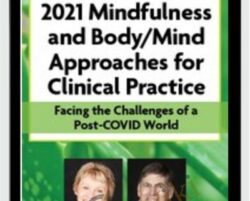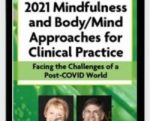As we left 2020 behind, healing professionals the world over will be challenged to help clients cope in the coming post-COVID world. It’s our duty to prepare with latest science, therapeutic techniques, and to show up whole ourselves.It’s what we trained for and what we’ve aspired to over many years.Watch clinician, author, mindfulness and meditation authority, Mary NurrieStearns, MSW, LCSW, C-IAYT, along with Rick NurriesStearns, an experienced retreat leader, in this on-line retreat for a unique training that combines lecture, research and experiential skill building, including how to guide body/mind movement in groups to build cohesion and to teach emotional regulation skills.Learn evidence-based techniques that empower your clients as they navigate the increased challenges and intensities associated with the pandemic. Listen to clinical examples and practice “good for the brain” techniques that increase emotional regulation skills, decrease shame, cultivate self-acceptance and instill healthy thought patterns; skills that are needed even more during daunting times. Practice body/mind approaches, specific mindfulness skills and self-compassion techniques to strengthen your existing treatment modalities and your therapeutic presence.Mary and Rick NurrieStearns have over 70 years of combined experience in mindfulness practices and body/mind healing. They are experts at showing clinicians like you how to empower clients to:Apply body/mind and mindfulness techniques to reduce anxiety, depression, shame, grief, chronic pain, and/or unworthiness.Use self-compassion to make dramatic therapeutic changes.Access beneficial memories to increase optimism and personal strengthIncorporate mindfulness strategies to stay in the moment to soothe distressing emotions and relieve old trauma patterns.Apply body/mind interventions to calm the nervous system, as well as increase body and present moment awarenessCultivate an inner best friend to mitigate shame and decrease self-blameStrengthen relationships and increase authenticity.Delve into basic neuroscience psychoeducation, evidence-based mind-body interventions, and mindfulness and self-compassion techniques that are invaluable for treating trauma, shame, depression, and anxiety.You will take away accessible clinical skills for safely approaching trauma, body/mind interventions for anxiety, self-compassion practices for healing unworthiness and grief, brain psychoeducation to reduce shame, and mindfulness interventions for thoughts associated with trauma, depression, pain, and shame.Purchase today! Set your clients on a pathway of recovery, resilience and overall well-beingInvestigate emotional motivation systems of the brain as they pertain to clients who have experienced trauma and mindfulness practices that improve treatment outcomes. Distinguish between the default network, salience network and central executive network and utilize this information for client psychoeducation. Evaluate negativity bias in the brain as it relates to clients who have experienced trauma and therapeutic mindfulness intervention. Assess the polyvagal theory and implications for resources for emotional regulation. Analyze the social brain and use of interpersonal neurobiology that activates the affiliation system of the brain to decrease sense of isolation and not being loved. Defend the necessity of including the body in emotional regulation and teach body-based clinical skills of breathing, body scan and body movement for regulation. Practice the use of Emotional Freedom Technique to help clients with emotional stabilization. Demonstrate components of mindful self-compassion for treating unworthiness and confronting the “inner critic.” Utilize mindfulness techniques for helping clients address negative thoughts regarding chronic pain. Demonstrate use of mindful awareness/movement to strengthen therapeutic relationship, build group cohesion, and for psychoeducation. Demonstrate techniques of body awareness and movement to alleviate the physical manifestations of shame. Practice specific mindfulness approaches for grief and loss related to adjusting to a post-pandemic environment.Evaluate a mindful communications process for conflict resolution and emotional bonding. Utilize concentration, distancing, naming, and thought substitution in treating depression producing thoughts. Get 4-Day Online Retreat: 2021 Mindfulness and Body/Mind Approaches for Clinical Practice: Facing the Challenges of a Post-COVID World – Mary NurrieStearns, LCSW, RYT, Only Price $157Neuroscience and Practices Specific to Anxiety and Trauma TreatmentNeuroplasticity—your brain’s ability to organize and learnThe triune brainPrimary emotional motivatorsPolyvagal nerve theory and clinical applicationsNegativity bias of your brainSavoring the good and affiliation system of the brainSocial Brain: Causes and ConditionsAccessing beneficial memoriesDefault mode network, salience network and central executive network of the brainWindow of tolerance psychoeducation and clinical applicationsEMOTIONAL STABILIZATION SKILLS—THE FIRST TASK IN TRAUMA TREATMENTImportance of including the body in stabilizationBody scan and sensory input for stabilizationMindful breathing practicesEmotional Freedom TechniquePractice leading mindful breathing exercises and simple movementClinical examples of emotional stabilization skillsMindfulness-Based InterventionsConfronting Trauma-Based Negative ThoughtsNonjudgmental observing of thoughtsNaming— write thoughts downRecognize, distance and dis-identify from narrative of self-identityRelate to the voice of the inner critic with mindful compassion and redirectionAddress negative thoughts regarding chronic painNourishing wholesome thoughts to undo thought patterns of trauma – repetition and concentrationHabit tendencies and neuronal pathwaysClinical examples of relating to thoughts therapeuticallyAlleviating Distressing EmotionsApproach, not avoid, emotions safely with mindfulnessBe there for griefComfort pose and self-love mantraEmotional Freedom Technique for client self-careClinical examples of treating distress with mercyIncreasing Self-Compassion and Emotional Resilience for Trauma and Anxiety ResolutionRecognize the power of inner voicesMindfulness interventions for developing self-compassionWho has seen your goodness? – restoring trustTeachers of compassionThe voice of the inner friendThree-part self-compassion noteOffering loving kindness to any inner aspect that feels not deservingCompassion for the inner criticClinical examples of utilizing selfcompassionTreating Trauma-Based ShameRepair unworthiness with mindfulnessbased interventionsImpact of shame on the brain – default network and pain systemThe physiology of shameDifferentiate among shame, defiance, and noble postureNarrative of unworthinessCreate a new narrative of selfClinical examples of treating unworthiness and shameGet 4-Day Online Retreat: 2021 Mindfulness and Body/Mind Approaches for Clinical Practice: Facing the Challenges of a Post-COVID World – Mary NurrieStearns, LCSW, RYT, Only Price $157Tag: 4-Day Online Retreat: 2021 Mindfulness and Body/Mind Approaches for Clinical Practice: Facing the Challenges of a Post-COVID World Review. 4-Day Online Retreat: 2021 Mindfulness and Body/Mind Approaches for Clinical Practice: Facing the Challenges of a Post-COVID World download. 4-Day Online Retreat: 2021 Mindfulness and Body/Mind Approaches for Clinical Practice: Facing the Challenges of a Post-COVID World discount.
4-Day Online Retreat: 2021 Mindfulness and Body/Mind Approaches for Clinical Practice: Facing the Challenges of a Post-COVID World
₹25,398.00







